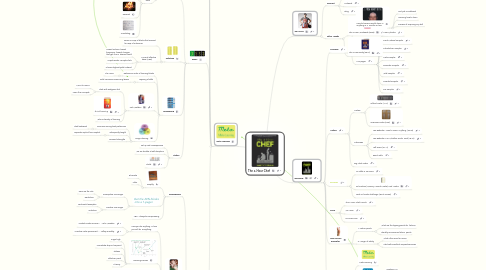
1. Tim Ferris
1.1. Connect
1.1.1. @tferriss on Twitter
1.1.1.1. #4hourchef
1.1.2. Pinterest
1.1.3. Blog
1.1.3.1. RSS
1.2. Other Books
1.2.1. The 4-Hour Workweek (2009)
1.2.2. The 4-Hour Body (2010)
2. Overview
2.1. Synopsis
2.1.1. How to become world-class in anything in 6 months or less
2.1.1.1. Not just a cookbook
2.1.1.2. Learning how to learn
2.1.1.3. Process of acquiring any skill
2.1.2. 672 pages
2.1.2.1. 1500+ photos
2.1.2.2. Front Material Sampler
2.1.2.3. Introduction Sampler
2.1.2.4. Meta Sampler
2.1.2.5. Domestic Sampler
2.1.2.6. Wild Sampler
2.1.2.7. Scientist Sampler
2.1.2.8. Pro Sampler
2.2. Videos
2.2.1. Trailers
2.2.1.1. Official Trailer (1:13)
2.2.1.2. Overview Trailer (2:58)
2.2.2. Interviews
2.2.2.1. Leo Babauta I: How to Learn Anything (40:29)
2.2.2.2. Leo Babauta II: On Whether Goals Suck (18:47)
2.2.2.3. Jeff Goins (37:11)
2.2.2.4. Ramit Sethi
2.2.3. Big Think video
2.3. Bonuses
2.3.1. 24 Skills in 48 Hours
2.3.2. Ed Cooke's (Memory Grand Master) card matrix
2.3.3. Deck Of Cards Challenge (win $10,000)
2.4. Press
2.4.1. The 4-Hour Chef Launch
2.4.2. WSJ.com
2.4.3. NYTimes.com
2.5. Two success principles
2.5.1. 1. Failure points
2.5.1.1. What are the tipping points for failure?
2.5.1.2. Identify & overcome failure points
2.5.2. 2. Margin of safety
2.5.2.1. What's the room for error?
2.5.2.2. Start with excellent recipes/resources
2.6. 4HC: 5 Parts
2.6.1. Meta-Learning
2.6.2. The Domestic
2.6.2.1. Cooking 101
2.6.2.2. Cooking principles
2.6.2.2.1. 14 core lessons
2.6.2.2.2. 5-20 mins each
2.6.3. The Wild
2.6.3.1. The great outdoors
2.6.4. The Scientist
2.6.4.1. Creative cooking
2.6.5. The Professional
2.6.5.1. Taking cooking into your own hands
3. Meta Learning
3.1. Tim's framework & strategies for learning anything
3.1.1. Learning is VALUABLE
3.1.1.1. Learn how to learn
3.1.2. Time is VALUABLE
3.1.2.1. Learn quickly
3.1.3. Tools of learning are not fixed, nor is the amount of time needed to become world-class
3.2. Early years
3.2.1. Inhaling hormones
3.2.1.1. Short-term memory
3.2.1.2. Not a sustainable solution
3.2.2. Joyo Kanji
3.2.2.1. The magic of 1-pager
3.2.2.1.1. 1945 of Japanese characters on 1 page
3.2.2.2. Material beats method
3.2.2.2.1. WHAT you study is more important than HOW you study
3.2.3. Michael Phelps vs. Shinji Takeuchi
3.2.3.1. Seek out the anomalies, the Shinji's
3.3. The method
3.3.1. Is the method effective?
3.3.2. Is the method sustainable?
3.3.3. Efficiency: speed determines value
3.4. DiSSS
3.4.1. Deconstruction
3.4.1.1. Exploration
3.4.1.2. Identify minimal learning units (Lego blocks)
3.4.1.3. Break the whole into pieces
3.4.1.4. Tools
3.4.1.4.1. Reducing
3.4.1.4.2. Interviewing
3.4.1.4.3. Reversal
3.4.1.4.4. Translating
3.4.2. Selection
3.4.2.1. Focus on 20% of blocks that account for 80% of outcomes
3.4.2.2. Minimal effective dose (MED)
3.4.2.2.1. Lowest volume, lowest frequency, fewest changes that get us our desired result
3.4.2.2.2. Simple works, complex fails
3.4.2.2.3. Choose highest-yield material
3.4.3. Sequencing
3.4.3.1. Determine order of learning blocks
3.4.3.1.1. The ABCs
3.4.3.2. Layering of skills
3.4.3.2.1. Total Immersion swimming lesson
3.4.3.3. Josh Waitzkin
3.4.3.3.1. Start with endgame first
3.4.3.3.2. Art of Learning
3.4.3.3.3. Value & beauty of learning
3.4.3.4. Tango dancing
3.4.3.4.1. Common among best performers
3.4.3.4.2. Infrequently taught
3.4.3.4.3. Personal strengths
3.4.4. Stakes
3.4.4.1. Set up real consequences
3.4.4.2. We are terrible at self-discipline
3.4.4.3. Stickk
3.5. CaFE
3.5.1. Compression
3.5.1.1. Simplify
3.5.1.1.1. Eliminate
3.5.1.1.2. Filter
3.5.1.2. Get the 20% blocks into a 1-pager
3.5.1.2.1. Prescriptive One-Pager
3.5.1.2.2. Practice One-Pager
3.5.1.3. ABC: Always be compressing
3.5.2. Frequency
3.5.2.1. How you do anything is how you will do everything
3.5.2.1.1. "Details create success." - John Wooden
3.5.2.1.2. "Practice make permanent" - Jeffrey Zurofsky
3.5.2.2. Learning Process
3.5.2.2.1. Sugar high
3.5.2.2.2. Immediate drop & low point
3.5.2.2.3. Plateau
3.5.2.2.4. Inflection point
3.5.2.2.5. Fluency
3.5.2.3. Serial Position Effect: Improved recall with breaks
3.5.2.3.1. Primacy effect
3.5.2.3.2. Recency effect
3.5.2.4. Von Restorff Effect
3.5.2.4.1. Add unique items for better recall
3.5.3. Encoding
3.5.3.1. Convert unfamiliar into familiar
3.5.3.2. Anchor new material to what you know
3.5.3.3. Mnemonics
3.5.3.3.1. Acronyms
3.5.3.3.2. Acrostics
3.5.3.3.3. Heuristics
3.5.3.4. Consonant System Mnemonic (Major System)
3.5.3.4.1. Rules
3.5.3.4.2. Combine with Loci System
3.5.3.4.3. Tim's matrix
